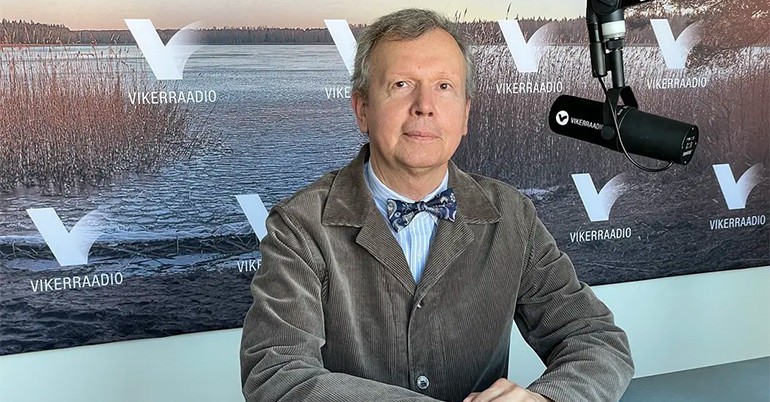Margus Laidre: Every Estonian essentially has to act as a diplomat
Due to Estonia's size, every Estonian is also in effect an ambassador for their country, says Margus Laidre, a diplomat with more than 30 years' experience including stints as ambassador to Finland and to Russia.
Appearing on Vikerraadio's "Kajalood" program Saturday, Laidre said that while the role of diplomats has changed significantly in recent decades, even today, nothing can take the place of traditional diplomacy.
"When we started out as young diplomats more than 30 years ago, the seemingly unforced atmosphere at diplomatic receptions could not be underestimated," Laidre recalled.
"This made it viable to approach people without anyone wondering why they had done so, why they were asking me about this or that."
As a colleague, Jaak Jõerüüt, once said, an ambassador no longer needs, so to speak, to attend nibble-and-gab sessions with cold cuts or to drink whisky, in accordance with local tradition, with representatives of a host nation, in order to obtain tidbits of information which might be of interest to the represented nation.
"Information moves at a rapid rate, and heads of state and top politicians get meet face-to-face more often than before, but nothing can replace traditional diplomacy – that of having a permanent presence on the ground."
"Only if you are breathing in the same atmosphere, drinking the same water and eating the same food, day in, day out, as the people in the host country, can you obtain a more accurate understanding of the country in question," Laidre went on.
An Estonian embassy, especially in far away countries, is not only the first point of contact, but often the only place that represents Estonia for those Estonians living in that country.
"We Estonians are very few in the world. For this reason, being an Estonian is not just a question of belonging to a certain nationality, it's a 'profession' too. In this sense, all Estonians are diplomats in fact," Laidre went on.
Reward or punishment?
However, representing your country abroad can be a very lonely job at times. There are plenty of examples in history where an ambassador is sent to a diplomatic mission, and then is "forgotten."
Margus Laidre himself said he felt this most vividly during his last posting, to Moscow, hardly an easy mission for any ambassador. "For a time, I felt a sense of loneliness, as if I had expected more support from my home country," Laidre conceded.
At the time he found out about the appointment as ambassador to Moscow, Laidre recalls, he was still Estonia's ambassador to Finland (2014-2018), and on talking about his new post with the Finnish foreign minister at the time, Timo Soini, the latter asked: "Margus, is this a reward or a punishment?"
As it turned out, there were positive aspects to an otherwise challenging assignment.
"I would venture to say," Laidre said, "that despite the difficulties, Moscow was one of the most exciting missions of my diplomatic career."
What is the point of diplomacy?
The main idea behind diplomacy is influence, a British ambassador once
"But if you think a little more broadly," continued Laidre, "all communication between people constitutes influencing. We influence our interlocutor(s), unconsciously or not, when we present our views, when we want to convince someone."
"A diplomat has to meet people every day with whom they might not choose to consort otherwise or in their private life; sharing their time, interests and hobbies. But they have to do so for the job /.../ At the same time, no one can be forced into something that the foreign representative of a country dislikes."
By way of example, Laidre recalls the time when he was the ambassador in Finland, and he declined to attend any event organized by the Russian embassy for as long as Eston Kohver, an Estonian intelligence operative, remained abducted and imprisoned inside Russia (which he did, for a year, 2014-2015).
Only once Kohver was safely back in Estonia did Margus Laidre restore diplomatic communication with the Russian embassy in Helsinki.
Can we learn anything from history?
Laidre said in the interview that he sometimes feels that we in Estonia place ourselves outside of history itself. "We talk about what history has done to us, as if we are so small we cannot influence our destiny."
He cites the example of a medieval history seminar in Stockholm in 1990, where Swedish professor Herman Schück directly stated that Estonia does not have its own history, adding that the history of Estonians is rather the history of Germans, Russians and Swedes.
Laidre, who obtained a PhD in history, still feels as that we have forgotten that we ourselves have a responsibility towards our future.
"As a small country, our national feelings of self-preservation must be propagated, in many directions. We must always keep in mind that our most important and most major task is to do everything to ensure the preservation of the Estonian people, the Estonian language, the Estonian culture and the Estonian state."
"All other tasks must be subordinated to this simple, yet at the same time very challenging, goal," he stressed.
Margus Laidre was talking to Kaja Kärner.







